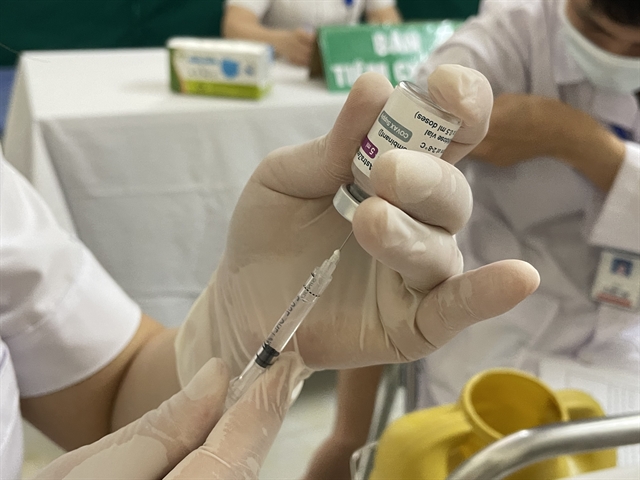
HÀ NỘI — Children in the 5-11 age group should be vaccinated with two doses, including those who have recovered from COVID-19, given the increasing number of infections and severe cases among children, according to Doctor Phạm Quang Thái, head of the northern regional office of the National Expanded Programme on Immunisation (NEPI).
He offered many insights into vaccination for children aged 5-11 during an online consultation with VnExpress online newspaper.
Mentioning a recent survey that showed more than 60 per cent of parents agree to their children being vaccinated against COVID-19, he said, the concerns of parents were understandable given the lack of information and evidence regarding the effectiveness and safety of the vaccine for children.
“We need to spend more time doing communication work, and release scientific evidence to ensure that the parents are aware that vaccines are safe and effective for children at those ages,” he said.
Responding to a query about the need to vaccinate children who mostly have mild or no symptoms if infected, he said the number of children contracting the virus was increasing.
Currently, the number of infections among adults is increasing, leading to a rise in infections among children too.
Though the number of severe cases in children is not as high as among adults, among severe cases, there is still a probability that its progress and lead to deaths, he said.
“Given a large number of infections among children, the number of severe cases and deaths wouldn’t be small,” he added.
“Working with children’s hospitals, I notice that the rate of long COVID-19 is not small. They are unvaccinated. For this group, despite great care and treatment, the likelihood of complications from COVID-19 like heart problems is high. And this risk is way higher than the risk of vaccinations.
“We haven’t had the data on the rate of COVID-19 infection among children in Việt Nam but the amount is quite large during this time. At children’s hospitals, the number of children in intensive care or receiving prolonged treatment has increased.”
At the National Children’s Hospital alone, there are hundred severe cases, many of them are on a ventilator, he said.
“This is to say that the number of infections among children is not small. When taking into account the total number, this [the severe cases] can be hundreds or thousands,” he said.
“We are closely monitoring the situation in the National Children’s Hospital and the children’s department of other hospitals.”
He quoted the FDA as noting that children in the 5-11 age group will receive a two-dose regimen of 10mg, one-third of the amount for adults. The shots were given 21 days apart.
“Vaccines for children use new technology, which will be better than those for adults so the risk of causing heart problems among this age group is lower than others,” he said.
Responding to a question about vaccine storage, he said during the working trips to the National Institute of Hygiene and Epidemiology, Pfizer accepted the cold chain system in Việt Nam.
“Our system is just as good as that of other countries in the world,” he said.
“The system keeps vaccines in standard conditions from the manufacturer to the central warehouse. From there, we move to the provincial and district warehouses. We use refrigerated trucks, and styrofoam boxes at negative temperatures,” he said.
“We have no problem with technology, equipment or human resources and can guarantee the safety and quality of vaccines as recommended by the manufacturers.
“What we are concerned with the most is the psychological response post-vaccination. In puberty, children often have emotional disorders, which is hard to distinguish from reactions to the vaccine,” he said.
He added that the authorities have conducted training to avoid the confusion between these two types of reactions to ensure children have the right treatment regimen.
Recent evidence shows that the rate of complications from COVID-19 among children is not high. However, there is a hidden risk and the rate of complication is at a concerning level.
Prolonged health issues caused by complications for children will be a huge burden for children, their family and society.
“Though the rate is not high compared to adults, it is still high,” Thái said.
“A solution to this issue is vaccines. Parents should use sources like newspapers or the news website of the health ministry for reference.”
“Experts are constantly working to study the effects of vaccines on children. We ensure that the shots given to children will be safe and effective. We only use safe products.”
Some provinces and cities may deploy vaccination programmes many days after receiving vaccines. It may be difficult at the beginning but later, when parents understand that their children will be protected and be safe thanks to vaccines, the rate of vaccination will increase.
“If we order just a limited amount of vaccines, they will be not enough. This is a challenge for the management agencies in charge of buying vaccines. Therefore, the government accepts to buy an amount more than needed,” he said.
“Priority will be given for vulnerable groups and localities hit hard by the pandemic. We expect that shots will be given to children who need it the most first.”
The surplus of vaccines will be stored in accordance with manufacturers’ regulations, he said.
Regarding vaccination for children recovering from COVID-19, he recommended that children are vaccinated right after infection to ensure they have more robust immunity to avoid reinfection and avoid long-COVID. VnExpress News
- Reduce Hair Loss with PURA D’OR Gold Label Shampoo
- Castor Oil Has Made a “Huge” Difference With Hair and Brow Growth
- Excessive hair loss in men: Signs of illness that cannot be subjective
- Dịch Vụ SEO Website ở Los Angeles, CA: đưa trang web doanh nghiệp bạn lên top Google
- Nails Salon Sierra Madre
 VnExpress News The News Gateway of Vietnam
VnExpress News The News Gateway of Vietnam





